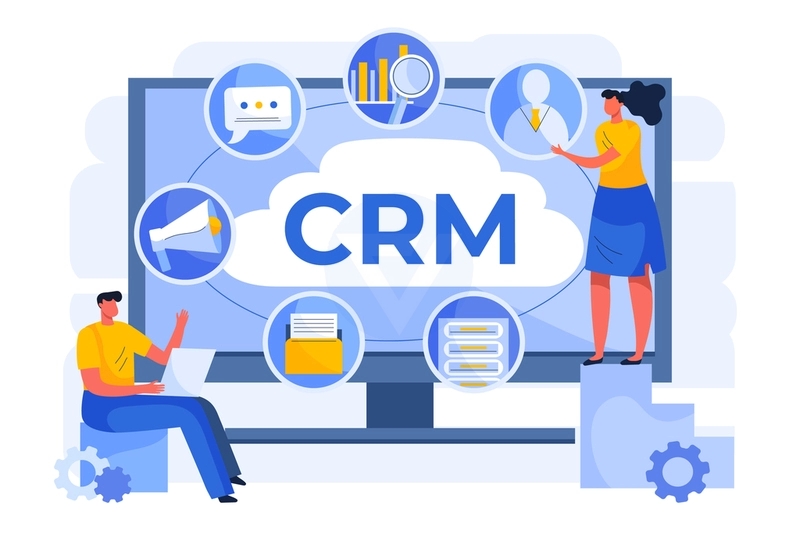
How can we use customer relationship management (CRM) software to improve our sales and marketing efforts?
Customer Relationship Management (CRM) software can significantly enhance sales and marketing efforts by providing tools and functionalities to streamline processes, improve communication, and gather valuable customer insights. Here are some ways to leverage CRM software for sales and marketing:
1. Centralize Customer Data: CRM software serves as a centralized database for storing and organizing customer information, including contact details, communication history, purchase history, and preferences. Having a comprehensive view of each customer enables sales and marketing teams to personalize their interactions, tailor marketing campaigns, and provide better customer service.
2. Lead Management and Tracking: CRM software allows you to efficiently manage and track leads throughout the sales funnel. You can capture leads from various sources, track their progress, assign them to sales representatives, and monitor their interactions with your company. This ensures that no leads are overlooked, and you can effectively nurture prospects to conversion.
3. Sales Pipeline Management: CRM software provides visibility into the sales pipeline, allowing you to track deals at different stages, identify bottlenecks, and forecast revenue. Sales representatives can prioritize their activities, focus on high-potential opportunities, and collaborate effectively with team members to move deals forward.
4. Automate Sales and Marketing Processes: CRM software offers automation capabilities, such as email marketing, lead nurturing, and follow-up reminders. Automated workflows can be created to send personalized emails, trigger notifications, assign tasks, and schedule appointments. These automation features save time, ensure consistency, and improve efficiency in sales and marketing activities.
5. Customer Segmentation and Targeting: CRM software enables you to segment your customer base based on various criteria, such as demographics, purchase history, or engagement level. This segmentation allows you to create targeted marketing campaigns tailored to specific customer segments, increasing the relevance and effectiveness of your communications.
6. Personalized Marketing Campaigns: With CRM software, you can personalize your marketing campaigns by leveraging customer data. By understanding customer preferences, behaviors, and purchase history, you can deliver targeted messages, offers, and recommendations that resonate with each customer, increasing engagement and conversion rates.
7. Improved Customer Service: CRM software empowers customer service teams by providing access to comprehensive customer data and interaction history. This enables them to provide personalized and efficient support, resolve issues promptly, and deliver a superior customer experience. Satisfied customers are more likely to become repeat customers and advocates for your brand.
8. Performance Analytics and Reporting: CRM software offers robust reporting and analytics capabilities. You can generate reports on sales performance, campaign effectiveness, lead conversion rates, and customer behavior. These insights help you identify strengths, weaknesses, and opportunities, allowing you to refine your sales and marketing strategies for optimal results.
9. Integration with Other Tools: Many CRM software platforms integrate with other sales and marketing tools, such as email marketing software, social media platforms, and customer support systems. This integration ensures seamless data flow, eliminates manual data entry, and enhances collaboration among different teams.
10. Continuous Improvement: CRM software provides a feedback loop for continuous improvement. By analyzing customer data, sales metrics, and campaign performance, you can identify areas for improvement, optimize your sales and marketing strategies, and make data-driven decisions to achieve better results over time.
By leveraging CRM software effectively, businesses can streamline their sales and marketing efforts, improve customer engagement, enhance productivity, and drive revenue growth. It acts as a powerful tool for managing customer relationships, optimizing processes, and delivering personalized experiences that foster long-term customer loyalty.
When choosing a CRM software for sales and marketing, it's essential to consider several key features that align with your specific business needs. Here are some crucial features to look for:
1. Contact and Lead Management: The CRM should provide robust capabilities for managing contacts and leads effectively. Look for features such as lead capture, lead assignment, lead tracking, contact segmentation, and the ability to store comprehensive contact details and interaction history.
2. Sales Pipeline and Opportunity Management: A good CRM should offer visual sales pipeline management, allowing you to track deals at different stages, forecast revenue, and monitor the progress of opportunities. The software should enable you to customize sales stages, set reminders, assign tasks, and collaborate with team members.
3. Email Marketing and Automation: Look for CRM software that includes email marketing features and automation capabilities. This should include the ability to create and send personalized emails, automate follow-ups and nurture campaigns, track email engagement, and integrate with popular email marketing platforms.
4. Reporting and Analytics: The CRM should provide robust reporting and analytics features to track key sales and marketing metrics. Look for customizable dashboards, pre-built reports, and the ability to generate insights on sales performance, lead conversion rates, campaign effectiveness, and customer behavior. Advanced analytics capabilities like data visualization and forecasting can also be valuable.
5. Integrations: Consider CRM software that integrates with other essential tools and platforms you use for sales and marketing. This may include email marketing software, customer support systems, project management tools, or social media platforms. Integration ensures seamless data flow and enhances productivity.
6. Mobile Accessibility: In today's mobile-driven world, having a CRM software with mobile accessibility is crucial. Look for a CRM that offers a mobile app or a responsive web interface, allowing sales and marketing professionals to access and update customer data, manage tasks, and collaborate while on the go.
7. Customization and Scalability: A flexible CRM software should allow you to customize fields, workflows, and processes to align with your specific business requirements. It should also be scalable, accommodating your growing sales and marketing needs as your business expands.
8. User-Friendly Interface: The CRM should have an intuitive and user-friendly interface that is easy to navigate and use. A clean and organized layout, along with a logical workflow, enhances user adoption and reduces the learning curve for your sales and marketing teams.
9. Security and Data Privacy: Data security is paramount when selecting a CRM software. Ensure that the CRM provides robust security measures, including data encryption, user access controls, and compliance with relevant data protection regulations such as GDPR (General Data Protection Regulation).
10. Vendor Support and Training: Consider the level of vendor support and training available with the CRM software. Look for comprehensive documentation, online resources, and responsive customer support to assist you in case of any issues or questions. Training materials and webinars can also help your team fully utilize the CRM's capabilities.
Remember to evaluate your specific business requirements, budget, and long-term goals when selecting a CRM software. It's also helpful to involve key stakeholders and conduct thorough demos or trials to ensure the chosen CRM aligns with your sales and marketing processes and provides the necessary features to drive your business growth.
Share It:
Tags:













